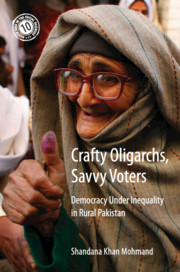Description
Does Voting Matter?
Competitive Clientelism and Inequality in Pakistan
South Asia in the Social Sciences Series
Author: Mohmand Shandana Khan
Language: English
Subject for Does Voting Matter?:
Approximative price 96.56 €
In Print (Delivery period: 14 days).
Add to cart
Publication date: 12-2018
320 p. · Hardback
320 p. · Hardback
Description
/li>Contents
/li>Biography
/li>
How does democracy empower marginalized voters under conditions of inequality? The author probes into this question grounding her research in the context of Pakistan, an emerging democracy whose voters have actively been involved in defining its political history but about whom we know very little. They turn up in sizeable numbers to vote during elections, even under military rule, prompting all kinds of contradictory stereotypes about how Pakistani rural voters behave as electoral cannon fodder. But no one has looked very closely at why they vote as they do, or why they vote at all when their political agency is severely limited by high socio-economic inequality. By using original data collected across different villages and households in rural Pakistan, this book finds that electoral politics enables even the most marginalized voters to strategically further their interests vis-a-vis elite groups, but that persistent inequality limits their ability to organize or compete.
Glossary of local terms; List of Tables and Figures 1. Introduction: Rural Voters under Inequality in Pakistan 2. Colonial Constructs and Post-colonial Politics: 1849–2013; 3. Sahiwal: From Domination to Intermediation; 4. Local Competition and Bargaining Power: Conceptualizing Political Engagement in Rural Punjab; 5. Bargaining with Landlords: Comparing Political Engagement in Unequal Contexts; 6. Structural Inequality and Variations in Political Engagement; 7. When Do Shifts in Political Engagement Occur?; 8. Conclusion: The Future of Pakistan's Democratic Transition; Annex 1: Chronology of political events in Pakistan; Annex 2: Index of political engagement (IPE) scores for 38 villages; Annex 3: Research instruments; Annex 4: Detailed descriptions of household variables used in multivariate regression analysis; Bibliography; Index.
Shandana Khan Mohmand is a Research Fellow at the Institute of Development Studies, University of Sussex, and an Associate Fellow at the Institute of Development and Economic Alternatives in Pakistan. Her research and writings explore the fields of political participation, inequality, and the political economy of public policy and service delivery. She has contributed to both policy and social science research in these areas.
© 2024 LAVOISIER S.A.S.




